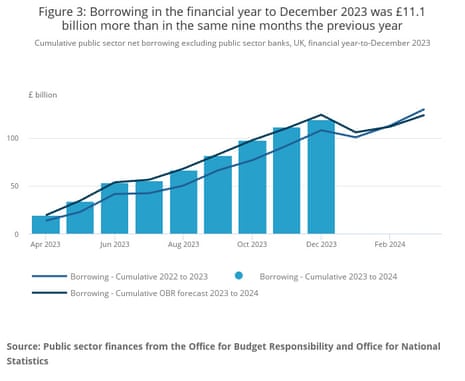Key events
Trott: economy is beginning to turn a corner
Chief Secretary to the Treasury, Laura Trott, has commented on this morning’s UK borrowing figures, saying:
“Protecting millions of lives and livelihoods during Putin’s energy shock and a once in a century pandemic has created economic challenges. However, it is right that we pay back these debts so future generations are not left to pick up the tab.
“Because of this Government’s decisive action, the economy is now beginning to turn a corner: Inflation has more than halved. Debt is on track to fall as a share of the economy. And we have been able to afford tax cuts for 27 million working people, and an £11 billion tax cut to drive business investment. “
The broader picture is that the UK national dent was clocked at £2.685 trillion at the end of December 2023, which is around 97.7% of UK GDP.
That’s 1.9 percentage points higher than in December 2022 and the highest level since the early 1960s.
Introduction: UK borrowing falls
Good morning, and welcome to our rolling coverage of business, the financial markets and the world economy.
Britain’s monthly government borrowing fell last month, potentially giving chancellor Jeremy Hunt more room for tax cuts in the March budget.
Figures just released by the Office for National Statistics show that the UK’s public sector net borrowing (excluding public sector banks) fell to £7.8bn in December.
That’s the lowest figures for any December since 2019, just before the Covid-19 pandemic, just half as much as the UK borrowed to balance the books in December 2022.
It’s also a lot lower than forecast; economists polled by Reuters had expected public sector net borrowing, excluding state-owned banks, to hit £14bn.
Falling inflation helped to push down borrowing, by lowering the interest bill on index-linked government debt.
Central government debt interest payable was £4bn in December, £14.1bn less than in December 2022, the ONS says, due to the fall in the Retail Price Index measure of inflation.
So far this financial year (since April), the UK has borrowed £119.1bn, which is £5bn lower borrowing than the £124.1bn forecast by the Office for Budget Responsibility.
That indicates there is wiggle-room for some fiscal loosening, while keeping within the government’s fiscal rules.
This is the fourth-highest borrowing bill at this stage of the financial year since monthly records began in 1993, behind the Covid-19 years of 2020, 2021, and 2009 following the global financial crisis.

Last week in Davos, Hunt dangled the prospect of big tax cuts in his March budget, telling reporters that he wanted to move in the direction of a low-tax economy.
Speaking at the World Economic Forum, the chancellor said:
“In terms of the direction of travel we look around the world and we note that the economies growing faster than us in North America and Asia tend to have lower taxes, and I believe fundamentally that low-tax economies are more dynamic, more competitive and generate more money for public services like the NHS.
That’s the direction of travel we would like to go in but it is too early to say what we are going to do.”
Also coming up today
Workers from Tata’s steelworks in Port Talbot are heading to Parliament today, ahead of a House of Commons debate on the future of the plant.
The debate was called by the Labour Party, following the announcement last week that Tata is planning to close its blast furnaces at Port Talbot and is intending to cut 2,800 jobs. Labour will use an opposition day debate to force a vote on the issue….
Investors in the City will be digesting the latest policy decision from the Bank of Japan overnight – it left interest rates at -0.1%, and stuck to its yield curve control policy that keeps the upper limit for 10-year Japanese government bond yield at 1%.
BOJ board members also lowered their forecast for core consumer inflation.
The agenda
-
7am GMT: UK public finances for December
-
10.15am GMT: Treasury Committee inquiry into SME access to finance
-
3pm GMT: Eurozone consumer confidence index







